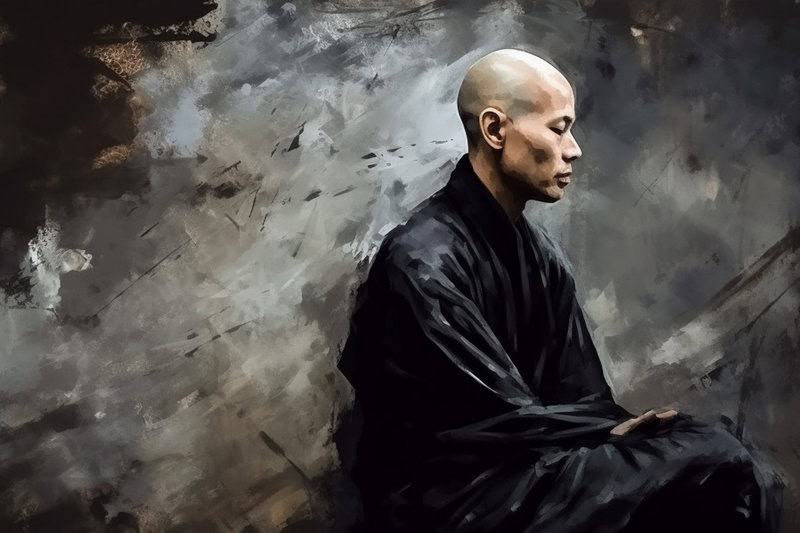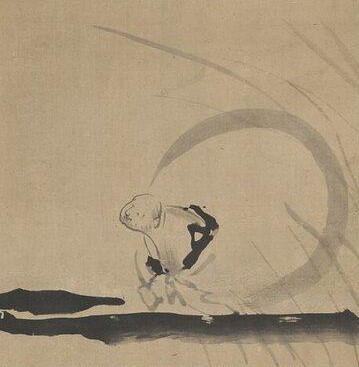I love this quote by Shunryu Suzuki.
It’s not about having special experience. No experience will ‘save you’ or give you eternal happiness. You cannot take refuge in particular experiences, however uplifting or extraordinary. Not satori, not insight, not enlightenment, not getting there.
Zen is not some kind of excitement, but concentration on our usual everyday routine.
Shunryu Suzuki (鈴木 俊隆)

It’s just right here, right now, opening to what is, fully, deeply, clearly. Not trying to get somewhere else. Not trying to change or manipulate it. Not trying to get comfortable. Not preferring this to that.
And being able to rest in it, this nowness, without reactivity. Rest in whatever arises. Rest in the groundlessness of experience. Rest in whatever life serves up. Rest there, with an open heart. Allowing the moment to soak you, to teach you, to whisper in your ear.
And when you can just rest there, in however it is, then you’ll know what to do, in each and every experience. Without thought, without plans, without judgment, without agendas.
So we can just get on with life, without trying to get somewhere else, each moment open, each moment aware, each moment knowing what it is that needs to be done. Not for me, not for you, but just what needs to be done.
You don’t have to chase after something special. Special is all around, already here. Just open to it.
And then the Dakini’s warm breath will be felt at your ear.





such clear writing, this post is a gem and the world is complete.
thank you,
Lune
Thanks for your reply. This is an issue which intrgues me deeply. I have studied Buddhist philosophy, and have an established practice, for quite a while now, about 25 years . I have just finished writing a book about quantum physics and Buddhist philosphy (www.quantumbuddhism.com) and during the course of the eight years research I studied in depth many of the classic Buddhist texts – Yogacara, Madhyamaka and so on. I also practice various forms of meditation. My own primary perspective is Tibetan and therefore I am familiar with the instructiuons on meditation by masters like Kamalashila and Tsongkhapa etc. I have also read the orginal suttas (not all of course) and discussed various issues concerning practice with monks of both Mahayana and Theravada flavour.
I do not think that my qualm was an ontological one because the two truths are not ontological, in the sense that western philosophy understands ontology. In fact as I understand it a fundamental feature of the Buddhist perspective is the inextricable interconnection between epistemology and ontology. Remarkably this is exactly the discovery of quantum physics, the mind’s epistemological attitude so to speak becomes ontology. This is precisely why the teaching of ‘letting go’ is correct on one level.
But the question remains – why did masters of the Tibetan tradition, for instance, constantly emphaize the necessity to train the mind to a state of laser like focus, through calm abiding which could penetrate the nature of existence before ‘letting go’. I have had these discussions with various proponents of vipashyana, for instance, who get upset when I gently suggest that as far as I can see there is no evidence in the cannonical Buddhist teachings that vipashyana is possible without shamata. When I ask where the provenance of the teaching is to be found, they just get upset rather then telling me.
I guess what I would like is a little more detail – for instance the main Pali teaching is that the cultivation of the jnanas is preparatory for insight into emptiness. I seriously would like to know where the psychological attitude of ‘letting go’needs to be applied and how it functions on the path to insight into the nature of reality and enlightenment. This is of great interest to me because it is currently a matter of debate at a meditation group that I run.
Please understand that I am not trying to be difficult for the sake of it as some people I discuss the issue seem to think, whilst others think my perspective eminently sensible, I am merely trying to figure out precisely how this ‘letting go’ fits into the canonical Buddhist worldview.
With great respect
Graham
Hi Graham … actually the comment you refer to in the post (What’s it all about?) is more of the nature of a letting go, rather than an ontological statement …. and is immediately followed by ‘then everything becomes possible’ ….. through the letting go of clinging (to both what we think we are, and what we think we need in order to become ‘better’ in some way) .. then all things become possible …. in that space, marvellous things open up.
There is no contradiction between relative and ultimate in experience, despite how the words of conceptualisation seem to lead one to think there might be.
many thanks indeed for your comment ….
I understand what you are saying, but surely you must be careful with making such assertions which are from the ultimate point of view. Making assertions which suggest that there is ‘nothing to do, nowhere to go’ is, from the conventional point of view, contradicting the Buddha's initial teachings. If there is 'nowhere to go', why did the Buddha teach the noble eightfold path? By the way – you may be interested in->
http://www.quantumbuddhism.com
“allow the moment to soak you, teach you, whisper in your ear”
just that phrase brings me to stillness-
after all…
it’s only…
one wave…
I love your blog. Thank you for sharing this.